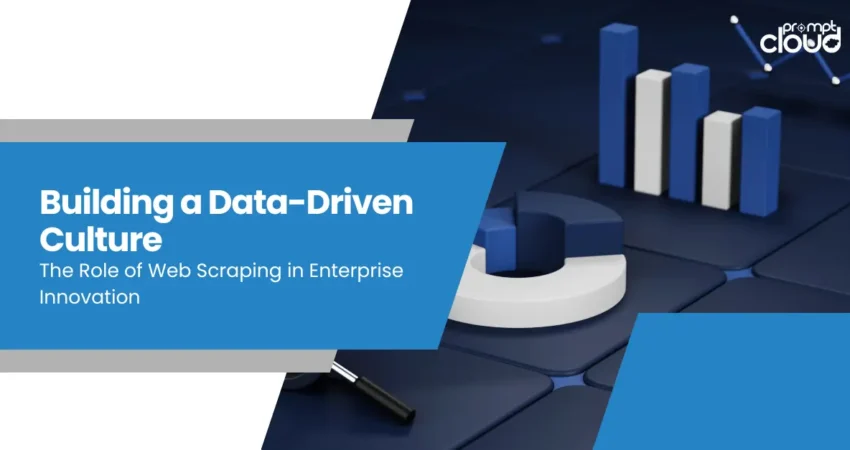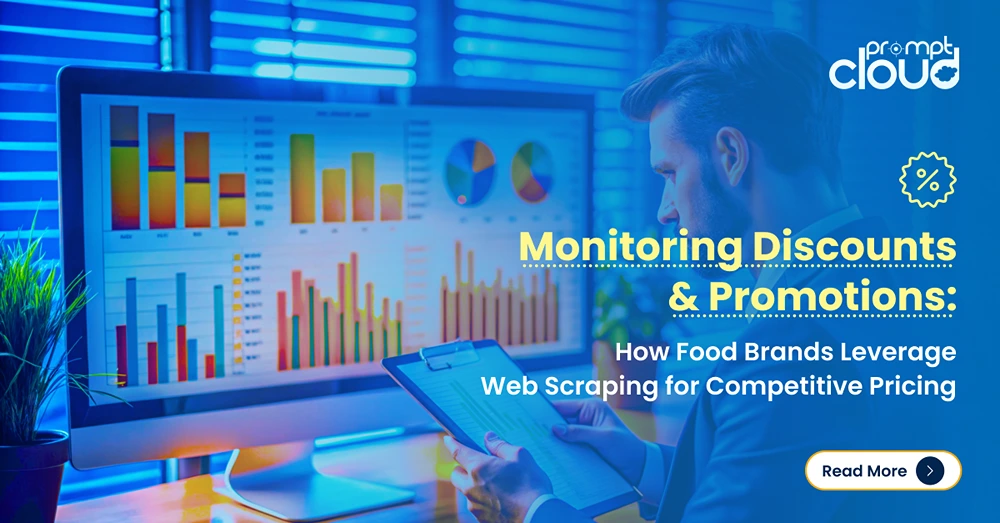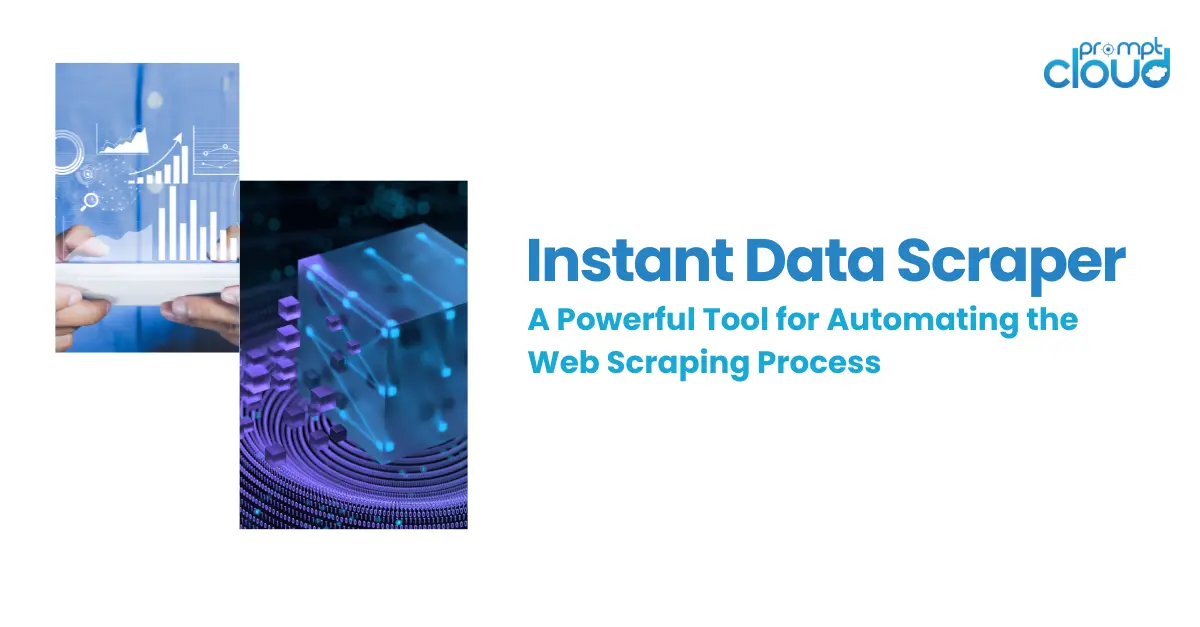
When it comes to making smart decisions and propelling growth, tapping into data has never been more important for modern businesses. Employing data-centered methods not only guides strategic planning but also enhances day-to-day operations and improves overall customer satisfaction. Central to becoming a truly data driven business is mastering the art of web scraping – a powerful technology capable of automating extensive data extraction tasks from websites.
Let’s dive deeper into exploring how web scraping contributes significantly to fostering innovative and prosperous data driven businesses.
Enterprise Web Scraping
Enterprise web scraping involves automated processes to extract large volumes of data from websites. It enables businesses to gather insights and inform strategies with fresh, relevant information from various online sources. Here’s what it typically includes:
- Structured Data Extraction: Collecting specific data from web pages and converting it to a structured format like CSV or a database.
- Automation: Efficiency through automated scraping tasks that run at scheduled times.
- Scalability: A robust infrastructure to handle scraping on a large scale without interruption.
- Compliance: Adherence to legal frameworks and respect for website terms of use.
- Data Integration: Incorporating scraped data seamlessly into business processes and systems.
Leveraging specialized tools and expertise, enterprise web scraping transforms raw web data into actionable business intelligence.
Gathering Valuable Insights through Competitor Monitoring
Keeping a constant watch on what your competitors do, focusing primarily on aspects like pricing strategy, merchandise variety, and advertising initiatives, is necessary if you wish to maintain a competitive advantage over them. Leveraging web scraping empowers businesses to keep close tabs on competitors effortlessly and consistently, granting them a substantial edge in staying agile and adaptive within their respective markets.
Comprehensive Market Research Fueled by Web Scraping
To succeed in our rapidly changing world, keeping pace with emerging trends and evolving consumer sentiments remains paramount. Utilizing web scraping grants businesses quick and convenient access to expansive pools of data sourced from diverse channels—social networks, review platforms, and trade journals among others. Examining these rich seams of information arms firms with deep foresight, enabling well-timed responses to shifting market dynamics and capitalizing on untapped possibilities.
Elevating Sales Performance via Smart Lead Generation
Lead generation represents a fundamental challenge faced particularly by B2B entities striving relentlessly towards commercial triumph. Happily, employing web scraping tactics greatly eases the burden of amassing quality leads by mechanically accumulating pertinent contact info scattered throughout prospective clients’ web pages, social media accounts, and sundry virtual locales. Equipped with this wealth of knowledge, sales departments may craft targeted approaches tailored precisely to individual clientele needs, thus amplifying engagement levels and achieving higher conversion ratios.
Optimal Pricing Decisions Backed by Real-Time Intelligence
Price determination constitutes a delicate balancing act between profitability and competitiveness. Invoking web scraping capabilities lets businesses collate dynamic pricing statistics culled from manifold avenues, yielding detailed analyses of prevailing tendencies within specific sectors. Ongoing surveillance of rival price points likewise guarantees continued relevance amidst ever-shifting market conditions while simultaneously bolstering bottom lines.
Risk Reduction Facilitated by Robust Fraud Prevention Measures
Effectively managing risk exposure ranks high amongst priorities for any flourishing enterprise. Deploying web scraping solutions permits companies to glean valuable intel regarding fraudulent behavior, regulatory noncompliance, and supply chain vulnerabilities. Financial establishments, specifically, stand to gain substantially from deploying web scraping systems designed to spot abnormal transactional activity indicative of possible malfeasance. Such proactivity fortifies operational stability and solidifies patron confidence alike.
Expanding Horizons – Additional Applications of Web Scraping Techniques
Beyond core functions outlined earlier, web scraping boasts further utility for burgeoning data-driven businesses:
- Curating content libraries: Media groups, writers, and scholars depend on web scraping to centralize material drawn from disparate corners of cyberspace, constructing comprehensive collections ideal for analytical scrutiny and educational dissemination.
- Tracking brand reputation: Organizations can surveil references to their corporate identifiers strewn about the internet, garnering insight into public opinion and reacting swiftly to negativity directed toward their brands.
- Investigating employment landscapes: Human resource specialists can scrutinize job data and remuneration scales to deduce workforce trends and devise savvy hiring plans.
Image Source: https://www.scrapehero.com/web-scraping-for-job-boards/
Integrating Web Scraping Data with Business Strategy
Implementing web scraping data into a data driven business strategy encompasses several stages. Initially, organizations pinpoint crucial performance measures (KPIs) aligned with their strategic objectives. Following this, they engage web scraping technologies to acquire essential information from the internet, focusing on aspects such as competitors’ pricing structures, customer opinions, and industry developments.
- Identify relevant data sources for scraping
- Define clear objectives and KPIs to monitor
- Use web scraping to collect pertinent information
- Analyze the data to uncover actionable insights
- Apply insights to refine marketing, pricing, and product development
- Monitor changes and adapt strategies accordingly
This continuous loop of scraping, analysis, and application helps businesses remain agile, tailor their offerings, and make data-backed decisions that drive growth and competitive advantage.
Impact of Web Scraping on Business Growth
- Web scraping accelerates market analysis, providing businesses with a wealth of data to inform strategic decisions.
- By extracting competitor pricing, enterprises can dynamically adjust their offerings, staying competitive in their markets.
- Access to customer sentiment via web scraping aids businesses in refining products and services, directly influencing customer satisfaction and retention.
- Data-driven marketing campaigns, enhanced by insights obtained through web scraping, lead to better-targeted efforts, increasing conversion rates.
- Operational efficiency also sees improvement as businesses use web data to streamline processes and identify industry trends, driving growth and innovation.
- The wealth of structured data from web scraping feeds into machine learning models, granting predictive insights, optimizing performance, and fueling informed expansion with reduced risks.
Embracing the Future of Data-Driven Decision Making
Adopting a data-driven mindset ranks among the most influential moves contemporary businesses can embrace to ensure resiliency and longevity. Web scraping emerges as a pivotal instrument for a data driven business intent on mining actionable insights, stimulating inventiveness, refining efficiencies, and elevating choice-making procedures.
By following established principles and tackling inevitable complications head-on, ambitious entities wield the transformative force of web scraping to unlock boundless growth prospects and secure enduring accomplishment.
FAQs:
How do I become a data-driven business?
Transforming into a data-driven business calls for infusing data analytics and insights into all dimensions of corporate decision-making processes. Start off by defining unequivocal strategic ambitions and selecting suitable KPIs to measure advancement towards those ends. Next, invest in reliable data storage and processing infrastructure to accommodate growing data demands. Collect both internal and external data, curating a diverse dataset spanning structured and unstructured formats. Engage advanced data science techniques to derive meaningful insights, applying machine learning algorithms where applicable. Finally, cultivate a culture centered on evidence-based choices, empowering employees to consult data during routine tasks and major projects alike. Remember, embarking on this journey requires commitment and patience, yet the rewards often manifest themselves in improved efficiency, enhanced customer experience, and increased revenue.
What is an example of a data-driven Organisation?
A prime example of a data-driven enterprise lies within the retail sphere, characterized by frequent utilization of advanced analytics for sustaining competitive superiority. Imagine a prominent clothing merchant engaging in predictive modeling practices to anticipate shifts in consumer interest influenced by previous sales records, meteorological phenomena, and geographical inclinations. Parallelly, this establishment could implement NLP mechanisms to discern and interpret customer perspectives extracted from social media commentaries and merchandise ratings.
As a result, the retailer stands poised to calibrate stock acquisitions astutely, distribute resources strategically, and satisfy evolving buyer desires, consequentially uplifting revenues and securing repeat clientele. Overall, this exemplary firm demonstrates how thoughtful integration of data-centric methods yields tangible results in today’s fiercely competitive global economy.
What are data-driven business decisions examples?
Organizations encounter abundant opportunities to exercise data-driven decision-making daily. Some representative instances comprise:
- Product development: Prioritize features resonating strongly with user requirements, determined through surveys, interviews, or usability testing.
- Marketing optimization: Personalize advertising messages according to audience demographics, psychographic attributes, and past behaviors.
- Supply chain management: Anticipate bottlenecks before they occur, guided by real-time delivery status updates and predictive maintenance schedules.
- Workforce planning: Assign personnel dynamically based on fluctuating project needs, supported by employee skill sets, availability metrics, and task prioritization models.
These examples underscore the far-reaching implications of incorporating data-driven decision-making across functional areas, ultimately contributing to greater efficiency, productivity, and profitability.
Why are companies becoming data-driven?
Nowadays, countless reasons compel businesses to adopt data-driven methodologies. Among these motivations are:
- Customer centricity: Understand audiences intimately, delivering customized experiences attuned to unique wants and expectations.
- Agility: Respond nimbly to shifting market trends and unexpected disruptions, enabled by timely insights derived from nuanced data streams.
- Operational excellence: Streamline processes, minimize waste, and reduce costs through data-guided interventions and systemic improvements.
- Differentiation: Establish distinct value propositions rooted in proprietary data assets, setting apart organizations from competitors vying for similar niches.
By pursuing these aims, companies recognize remarkable gains in customer loyalty, financial health, and technological prowess, all underpinned by a coherent, evidence-based approach to navigating the complexities of modern commerce.



















